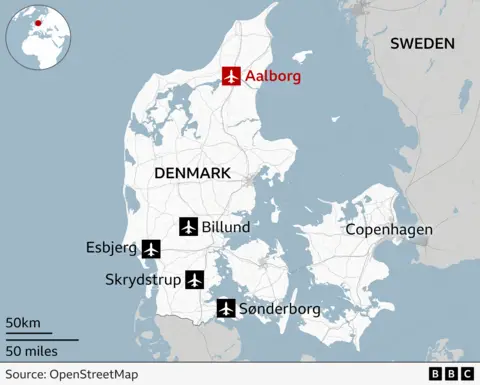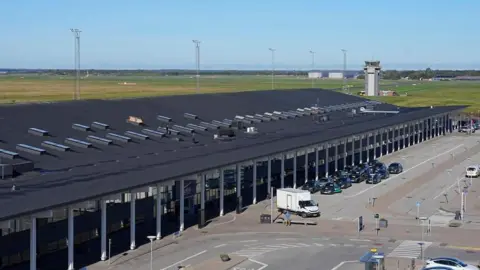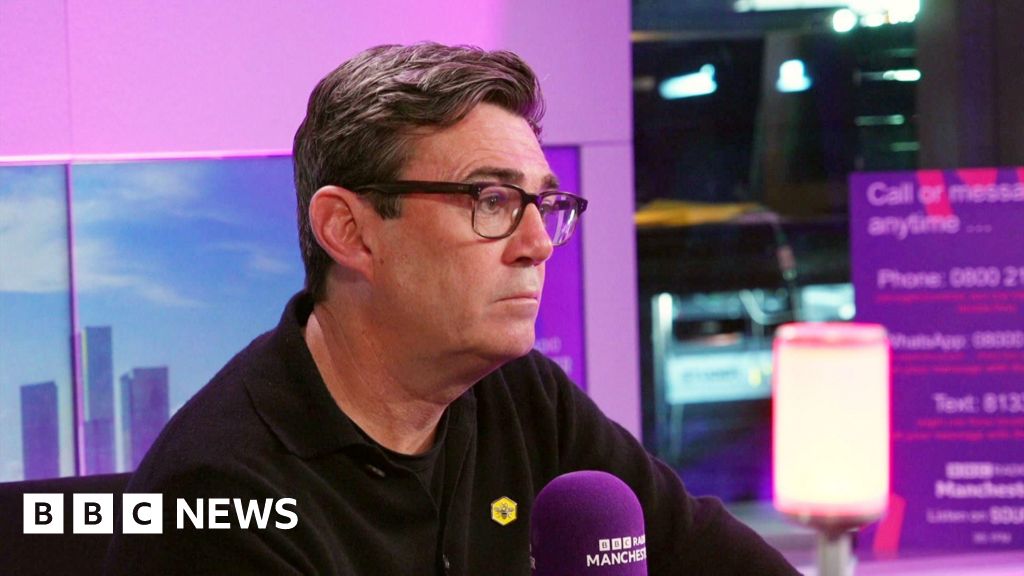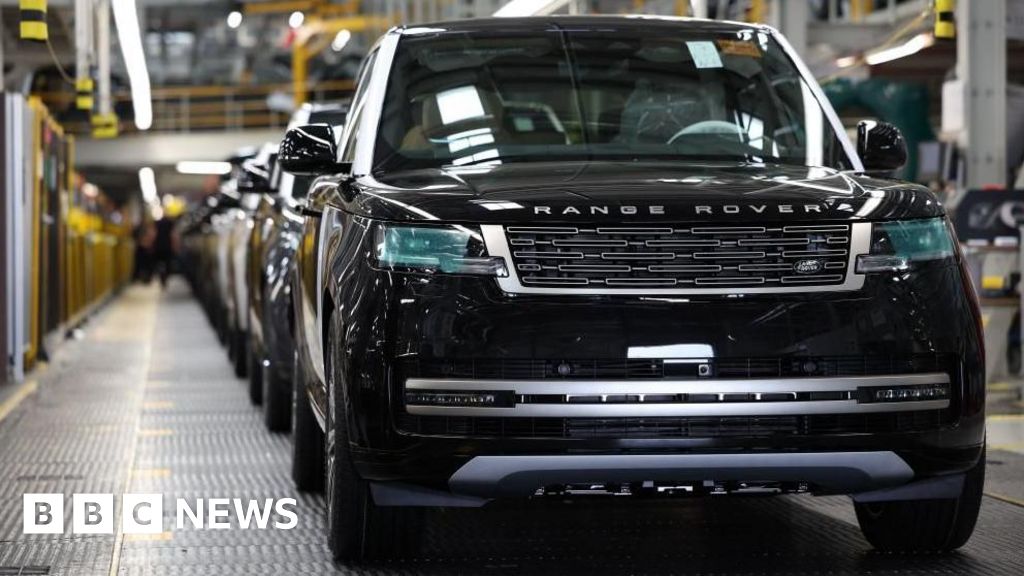Business
Denmark says ‘professional actor’ behind drone incursions over its airports

Read full article on post.
Aleks Phillips and
Adrienne Murray
Denmark says drones flown over its airports appear to be the work of a “professional actor” but there was no evidence of Russian involvement, after such activity disrupted its airspace for the second time in a week.
Aalborg airport was forced to shut down for several hours on Wednesday evening after green lights were spotted overhead, while Billund airport also briefly closed. Three smaller airports also reported drone activity.
On Monday, Copenhagen airport temporarily closed due to a drone incursion.
Defence Minister Troels Lund Poulsen told a news conference that the “hybrid attack” was part of a “systematic operation”, but said the devices had been launched locally.
A hybrid attack uses a mix of military and non-military tactics and is designed to interfere with a nation’s infrastructure or institutions.
Drones pose a risk of colliding with planes, particularly during take-off or landing, but halting air traffic in and out of an airport to avoid this can cause delays and flights being redirected elsewhere.
At least three flights were diverted away from Aalborg during the incident.
All the airports affected by the overnight incident sit on Jutland, the part of Denmark that is on the European mainland.
Drones were first sighted over the northerly Aalborg airport around 21:44 local time (19:44 GMT), state media reports. A few minutes later, police received reports of drone activity near small, southerly airports in Esbjerg, Sønderborg and Skrydstrup.
Possible drone activity over Billund prompted the closure of its airport for about an hour early on Thursday morning.
The drones were assessed to have cleared shortly before 03:00 and the airspace was reopened. Danish police are now seeking to find out who launched them.
Poulsen said there was no evidence to suggest Russia was behind the incursion. The Russian embassy in Copenhagen has denied “absurd speculations” of its involvement.
It described the incidents as “staged provocations”, saying they would be used “as a pretext for further escalating tension” over the war in Ukraine.
Russia has been accused of conducting hybrid attacks in the past, and Europe has been on high alert after several Nato member states reported Russian incursions in their airspaces.
Estonia and Poland requested a consultation with other Nato members last week, after around 20 Russian drones crossed into Poland and Russian MiG31 jets entered Estonian airspace in a separate incident. Romania, another Nato member, also said a Russian drone had breached its airspace.
Russia denied violating Estonia’s airspace, while it insisted the Polish incursion was not deliberate. It did not comment on the incident in Romania.
Suspicious drones have also been sighted over Germany and Sweden. All are suspected – but not proven – to be part of Russia’s indirect aggression towards Nato states supporting Ukraine.
Danish Prime Minister Mette Frederiksen said Russian involvement in the Copenhagen drone incursion could not be ruled out, describing it as “the most severe attack on Danish infrastructure so far”. The incident also saw Oslo airport in Norway temporarily close.
Kremlin spokesman Dmitry Peskov called the allegations “unfounded”.
Officials said the Danish Armed Forces had been affected by Wednesday’s incident, as Aalborg airport is also used as a military base. Skrydstrup is also home to an airbase.
The drones were not shot down, despite Danish authorities saying they had the ability to do so. Officials said this was due to concerns for the safety of the surrounding population.
“If we get the opportunity, we will take down the drones,” chief inspector Jesper Bøjgaard Madsen said.
Police said they did not believe the drones posed any danger to people at the airport or nearby residents, but asked the public to keep their distance from the area.
 EPA
EPAPeter Hummelgaard, Denmark’s justice minister, said the hybrid threats were “here to stay”.
Poulsen noted that an EU meeting had been called for Friday, at which enhanced drone preparedness across Europe would be discussed.
Earlier this month, European Commission President Ursula von der Leyen called for a “drone wall” to tackle incursions launched by Russia.
What that means is not entirely clear – but detecting the drones early and then destroying them are seen as key elements of such a strategy.
US President Donald Trump has gone as far as to say that Nato nations should shoot down Russian planes in their airspace, while Nato has warned it would use “all necessary military and non-military tools” to defend itself following the recent military incursions.
“We are a defensive alliance, yes, but we are not naive, so we see what is happening,” Nato’s secretary general Mark Rutte said.
Business
It’s up to Labour MPs, says Burnham on leadership bid speculation

Read full article on post.
Greater Manchester Mayor Andy Burnham has said it’s up to Labour MPs to decide whether the party needs a change of leadership, as he faced questions about his political ambitions.
He told the BBC he had given “honest” answers to questions about Labour MPs privately urging him to challenge Prime Minister Sir Keir Starmer.
The mayor said Labour MPs “were in touch with me” to discuss the leadership, but insisted he was not interested in a “personality contest”.
Burnham, who won a third term as Manchester mayor last May, said the Labour government needed a “proper plan for the country”, including one to beat Reform UK, and offered “to support the prime minister” in developing fresh policies.
Burnham is not an MP and would need to become one, by winning a by-election, and resign as mayor before he could even begin the process of trying to challenge Sir Keir as Labour leader.
But no by-elections have been called at the moment and there’s uncertainty over whether he would be selected as a candidate if the opportunity did arise.
Burnham answered questions about the rampant speculation over his future during a phone-in on BBC Radio Manchester on Thursday.
The appearance came after Burnham was asked about the prospect of him returning to Westminster and mounting a leadership challenge in an interview with the Daily Telegraph.
When asked if MPs had urged him to run for the top job, Burnham said: “People have contacted me throughout the summer – yeah.”
On BBC Radio Manchester, Burnham was asked whether a bid for the leadership would be the biggest gamble of his political career.
In reply, he said: “Whenever Westminster has gone into a moment I’ve somehow been drawn into it.”
He added: “People have been getting in touch with me. And obviously I’ve said to them, it’s not a matter for me.
“This is ultimately a matter for the party in Westminster to decide. I’m here to support the party in whatever way I can.”
Earlier Steve Reed, the housing secretary, said Burnham was entitled “to make his case” but pointed out he had previously promised to serve a full term as mayor.
Reed suggested Burnham had been taking “potshots” at the prime minister and dismissed discussion of the Labour Party’s leadership as “tittle tattle”.
The housing secretary said Sir Keir had “picked this party up off the floor and led us through a record general election victory”.
“Our job now is to talk to the country, not ourselves about how we’re going to change the things they care about,” Reed said.
Burnham’s critics have also pointed out Burnham, a former culture and health secretary, tried and failed twice to become Labour leader when he was an MP.
In previous leadership campaigns, Burnham lost out to Ed Miliband in 2010 and Jeremy Corbyn in 2015.
Burnham came fourth in 2010, and second in 2015, losing out by a wide margin to Corbyn, who won with almost 60% of the vote.
Burnham’s latest interview comes ahead of Labour’s autumn conference, and after Sir Keir faced pressure from some MPs following the resignation of his deputy Angela Rayner and his sacking of Peter Mandelson as the UK’s ambassador to the US.
There has been disquiet among Labour MPs over the government’s performance and the rise of Reform UK in national opinion polls.
The mayor also told the Telegraph that Number 10 had created a “climate of fear” among some MPs.
Setting out policies he said would “turn the country around”, Burnham called for higher council tax on expensive homes in London and the South East; £40bn of borrowing to build council houses; income tax cuts for lower earners; and a 50p rate for the highest-paid.
His comments in the Telegraph come after his interview with the New Statesman, which was seen as a pitch for a Labour leadership bid.
In that interview, he criticised the prime minister’s approach, saying there needed to be “wholesale change” to see off an “existential” threat to Labour.
Outlining his vision for the country, Burnham described his politics as “aspirational socialism”.
His main policy ideas involved more public control of housing, energy, water and rail.
One of Burnham’s most prominent policies as mayor of Greater Manchester was taking buses back into public control.
Burnham told the New Statesman he was ready to work with anybody with a “plan to turn the country around” – including the Liberal Democrats and Corbyn, who is in the proces of setting up a new left-wing party.
Labour MP Callum Anderson accused Burnham of “wishful thinking” on economic policy, for saying in his New Statesman interview the government has to “get beyond this thing of being in hock to the bond markets”.
Anderson, who is a parliamentary private secretary to the cabinet minister Liz Kendall, wrote on X: “To lead a Labour government – and a Labour Treasury – you can’t just dismiss the bond markets.
“Every pound spent on schools, hospitals and infrastructure depends on credibility with those who lend to the UK. Real change requires fiscal discipline, not wishful thinking.”
Business
Government could buy car parts to protect Jaguar Land Rover suppliers

Read full article on post.
Ministers are considering stepping in to support Jaguar Land Rover’s suppliers after the carmaker was forced to suspend production due to a cyber-attack.
The attack at the end of August meant JLR was forced to shut down its IT networks. Its factories remain suspended until next month at the earliest.
Fears are growing that some suppliers, in particular the smaller firms who solely rely on JLR’s business, could go bust without support.
One idea being explored is the government buying the component parts the suppliers build, suppliers have told the BBC they are sceptical about the success of such a scheme.
The idea behind such a move would be to keep the companies in JLR’s supply chain in business until production lines are up and running again.
“To say we’re disappointed is an understatement,” said one supplier, who did not wish to be named.
They added the government “simply don’t understand the complexity of what they’re dealing with”, and “we don’t need promises, we need help”.
Chancellor Rachel Reeves was asked during a ministerial visit on Thursday if the government planned to support firms in JLR’s supply chain.
She said the focus was on getting the business running again, and the government was going to do “everything we can to stand by the company and the wider supply chain”.
JLR, which is owned by India’s Tata Motors, normally builds about 1,000 cars a day at its three factories in Solihull and Wolverhampton in West Midlands, and Halewood in Merseyside.
However, workers were sent home following the hack – which first came to light on 1 September – with no firm return date.
About 30,000 people are directly employed at the company’s plants with about 100,000 working for firms in the supply chain. Some of these firms supply parts exclusively to JLR, while others sell components to other carmakers as well.
There are also other companies that could be indirectly affected, such as cafes near to the manufacturing plants and transport companies that work with JLR.
JLR confirmed this week that its factories will not resume operations until at least 1 October, with earlier reports suggesting the disruption could last into November.
If the government was to step in, it is believed to be the first time that a company would have received help as a result of a cyber-attack.
Unions have called for a Covid-style furlough scheme, but ministers have ruled this out given its likely cost, sources have told the BBC.
While the purchase and stockpiling of car parts by the government is an option on the table, this would present considerable logistical challenges.
JLR’s manufacturing process relies on the right part arriving at the right place, at the right time.
Another option being considered are government-backed loans to suppliers, though this is understood to be unpopular with suppliers.
Speaking to BBC Radio 4’s Today programme, former Conservative mayor of the West Midlands, Andy Street, said the companies in JLR’s supply chain had been “very successful” and he supported offering them government-backed loans.
An investigation is under way into the attack, which is believed to be costing the company at least £50m a week in lost production.
It has been reported by industry publication The Insurer that JLR had not been able to finalise an agreement for insurance against a cyber-attack ahead of the incident. The BBC has contacted JLR for a response.
In recent years, dozens of high-profile hacks have prompted governments to take measures to help companies affected, with experts at places like the National Cyber Security Centre sent to help recovery efforts.
But the idea of supporting companies financially is something that has not been considered, as the burden is normally shouldered by the insurance industry or the companies themselves.
In the US, authorities have carried out “hack backs” against cyber-crime groups, which has led to the clawing back of millions of dollars that criminals have taken in ransoms that are then given back to victims.
JLR also has large factories in Slovakia and China, as well as a smaller facility in India, which have also been affected by the shutdown.
The Business and Trade Select Committee is due to meet on Thursday afternoon to hear testimonies from businesses in JLR’s supply chain.
This evidence will be shared with the government afterwards.
Senior government figures are concerned about a pattern of cyber-attacks on UK institutions and businesses, such as the British Library, Marks & Spencer, and the Co-op.
A group calling itself Scattered Lapsus$ Hunters has claimed responsibility for the hack on JLR, Marks & Spencer, and Co-op.
On Thursday, Co-op reported that the cyber-attack it suffered earlier this year cost it at least £206m in lost revenues.
JLR has been receiving support from the National Cyber Security Centre and the National Crime Agency.
The Department for Business and Trade said ministers had discussed “the impacts of the cyber-incident and how JLR can work towards restarting production”.
In its most recent statement, JLR said: “Our focus remains on supporting our customers, suppliers, colleagues, and our retailers, who remain open.”
Additional reporting by Pritti Mistry and Michael Sheils McNamee
Business
Government could buy car parts to protect Jaguar Land Rover suppliers

Read more on post.
Ministers are considering stepping in to support Jaguar Land Rover’s suppliers after the carmaker was forced to suspend production due to a cyber-attack.
The attack at the end of August meant JLR was forced to shut down its IT networks. Its factories remain suspended until next month at the earliest.
Fears are growing that some suppliers, in particular the smaller firms who solely rely on JLR’s business, could go bust without support.
One idea being explored is the government buying the component parts the suppliers build, suppliers have told the BBC they are sceptical about the success of such a scheme.
The idea behind such a move would be to keep the companies in JLR’s supply chain in business until production lines are up and running again.
“To say we’re disappointed is an understatement,” said one supplier, who did not wish to be named.
They added the government “simply don’t understand the complexity of what they’re dealing with”, and “we don’t need promises, we need help”.
Chancellor Rachel Reeves was asked during a ministerial visit on Thursday if the government planned to support firms in JLR’s supply chain.
She said the focus was on getting the business running again, and the government was going to do “everything we can to stand by the company and the wider supply chain”.
JLR, which is owned by India’s Tata Motors, normally builds about 1,000 cars a day at its three factories in Solihull and Wolverhampton in West Midlands, and Halewood in Merseyside.
However, workers were sent home following the hack – which first came to light on 1 September – with no firm return date.
About 30,000 people are directly employed at the company’s plants with about 100,000 working for firms in the supply chain. Some of these firms supply parts exclusively to JLR, while others sell components to other carmakers as well.
There are also other companies that could be indirectly affected, such as cafes near to the manufacturing plants and transport companies that work with JLR.
JLR confirmed this week that its factories will not resume operations until at least 1 October, with earlier reports suggesting the disruption could last into November.
If the government was to step in, it is believed to be the first time that a company would have received help as a result of a cyber-attack.
Unions have called for a Covid-style furlough scheme, but ministers have ruled this out given its likely cost, sources have told the BBC.
While the purchase and stockpiling of car parts by the government is an option on the table, this would present considerable logistical challenges.
JLR’s manufacturing process relies on the right part arriving at the right place, at the right time.
Another option being considered are government-backed loans to suppliers, though this is understood to be unpopular with suppliers.
Speaking to BBC Radio 4’s Today programme, former Conservative mayor of the West Midlands, Andy Street, said the companies in JLR’s supply chain had been “very successful” and he supported offering them government-backed loans.
An investigation is under way into the attack, which is believed to be costing the company at least £50m a week in lost production.
It has been reported by industry publication The Insurer that JLR had not been able to finalise an agreement for insurance against a cyber-attack ahead of the incident. The BBC has contacted JLR for a response.
In recent years, dozens of high-profile hacks have prompted governments to take measures to help companies affected, with experts at places like the National Cyber Security Centre sent to help recovery efforts.
But the idea of supporting companies financially is something that has not been considered, as the burden is normally shouldered by the insurance industry or the companies themselves.
In the US, authorities have carried out “hack backs” against cyber-crime groups, which has led to the clawing back of millions of dollars that criminals have taken in ransoms that are then given back to victims.
JLR also has large factories in Slovakia and China, as well as a smaller facility in India, which have also been affected by the shutdown.
The Business and Trade Select Committee is due to meet on Thursday afternoon to hear testimonies from businesses in JLR’s supply chain.
This evidence will be shared with the government afterwards.
Senior government figures are concerned about a pattern of cyber-attacks on UK institutions and businesses, such as the British Library, Marks & Spencer, and the Co-op.
A group calling itself Scattered Lapsus$ Hunters has claimed responsibility for the hack on JLR, Marks & Spencer, and Co-op.
On Thursday, Co-op reported that the cyber-attack it suffered earlier this year cost it at least £206m in lost revenues.
JLR has been receiving support from the National Cyber Security Centre and the National Crime Agency.
The Department for Business and Trade said ministers had discussed “the impacts of the cyber-incident and how JLR can work towards restarting production”.
In its most recent statement, JLR said: “Our focus remains on supporting our customers, suppliers, colleagues, and our retailers, who remain open.”
Additional reporting by Pritti Mistry and Michael Sheils McNamee
-
Culture2 days ago
Taylor Swift’s new cinema outing generates more than €12million in just 24 hours
-
Environment1 week ago
Chimps drinking a lager a day in ripe fruit, study finds
-
Politics2 days ago
European Parliament snubs Orbán with vote to shield Italian MEP from Hungarian arrest
-
Culture2 weeks ago
Life, loss, fame & family – the IFI Documentary Festival in focus
-
Health3 days ago
EU renews support for WHO’s Universal Health Coverage Partnership
-
Culture2 days ago
Twilight at 20: the many afterlives of Stephenie Meyer’s vampires
-
Environment5 days ago
Key oceans treaty crosses threshold to come into force
-
Culture2 months ago
Fatal, flashy and indecent – the movies of Adrian Lyne revisited











































